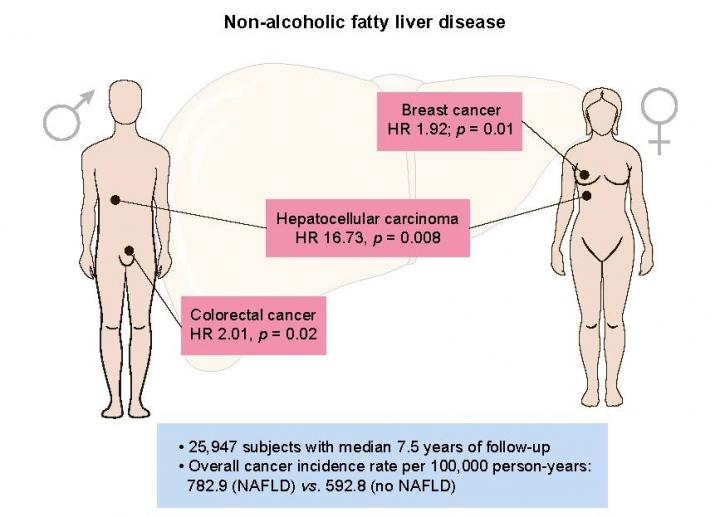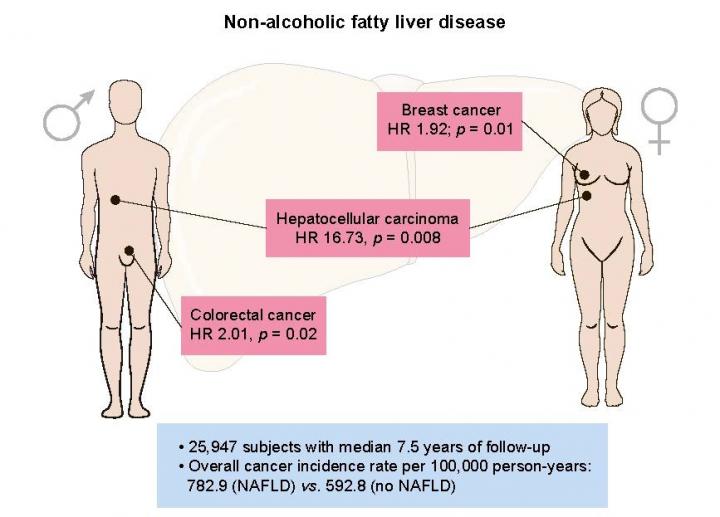
Credit: Journal of Hepatology
Amsterdam, November 14, 2017 – Nonalcoholic fatty liver disease (NAFLD) is one of the more common chronic liver diseases worldwide. It is associated with metabolic syndrome (i.e. insulin resistance and diabetes) and predisposes to cardiovascular disease. In a new study published in the Journal of Hepatology, researchers identified links not only between NAFLD and hepatocellular carcinoma (HCC), which have been well established, but also to cancers outside the liver, including colorectal and breast cancer.
"NAFLD is a very important multisystem disease to which much attention should be paid," explained lead author Gi-Ae Kim, of the Health Screening and Promotion Center, Asan Medical Center, University of Ulsan, College of Medicine, Seoul, Republic of Korea. "Despite its strong relationship with HCC development, little attention has been paid to the association of NAFLD with the development of other extrahepatic cancers. Our study presents statistical evidence that NAFLD is associated with extrahepatic cancers. We hope this study will raise awareness of the increased cancer potential that NAFLD might have."
This retrospective study evaluated the records of almost 26,000 Korean individuals who underwent health checkups from September 2004 through December 2005, who had no cancer diagnosis within one year of the checkup, and were followed for an average of 7.5 years.
Data revealed that 8,721 (33.6%) of individuals in the study were diagnosed with NAFLD, and cancer incidence in that group was 32% higher than in the non-NAFLD group. Once the data were adjusted for demographic and metabolic factors, significant risks for specific cancers became evident. Specifically, patients with NAFLD were 16.73 times more likely to develop HCC, twice as likely to develop colorectal cancer (men), and almost twice as likely to develop breast cancer (women).
High scores on two measurements of liver fibrosis, the NAFLD fibrosis score (NFS) and the FIB-4 score, were also associated with a higher risk for all cancers, and especially HCC. A high NFS score indicated an 87% increase in risk and high FIB-4 score a 74% increase in risk. These scores serve as a predictor of cancers and of HCC in particular.
Principal investigator Han Chu Lee, MD, of the Department of Gastroenterology, Asan Liver Center, Asan Medical Center, University of Ulsan College of Medicine, Seoul, Republic of Korea, noted, "Our results suggest that patients with NAFLD require multidisciplinary evaluation with particular attention to the development of cancers. Further studies are needed to specify which high-risk groups among patients with NAFLD carry a greater risk of developing specific cancers, including HCC, colorectal cancer, and breast cancer and that we should pay more attention to the cancer potential of NAFLD in clinical practice."
In an accompanying editorial, Peter Jepsen, PhD, of the Department of Hepatology and Gastroenterology and Department of Clinical Epidemiology, Aarhus University Hospital, Aarhus, Denmark, and co-authors add perspective. "NAFLD is likely to become the most prevalent liver disease in many countries, yet clinicians are struggling to determine exactly why they should care about NAFLD. Is it merely a bystander–a manifestation of the metabolic syndrome resulting in cardiovascular disease–or is it a liver disease in its own right?"
Dr. Jepsen concludes that despite a number of open issues, the Korean cohort study by Kim et al provides relevant and valid information on the association between NAFLD and cancer risk, and definite evidence on its strong association with HCC.
###
Media Contact
Sybrand Boer Iwema
[email protected]
31-204-852-781
@elseviernews
http://www.elsevier.com
Related Journal Article
http://dx.doi.org/10.1016/j.jhep.2017.09.012





